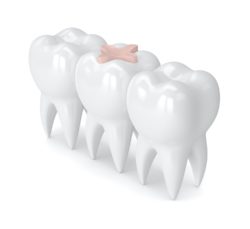A cavity forms in a tooth when plaque eats away at your teeth to create a hole in the surface. This hole will deepen, exposing the vulnerable interior of the tooth, until your dentist intervenes. They drill away this tooth decay and fill the hole with composite resin.
The dental filling both restores your dental structure and protects the tooth from further harm. But how long can you experience benefits from this cavity treatment? Read on to learn more about the aftermath following treatment with a dental filling.

How Long Do Fillings Stay in the Tooth?
When your dentist treats a cavity, they drill away every trace of decay in the tooth. The cavity is gone for good. They use resin to put a dental filling over the resulting hole in the tooth. The dentist sculpts the resin to suit your unique smile and hardens it into place with a specialized light.
The durable material will adhere to the tooth and remain there for ten years if you take proper care of your smile and dental work. A dental filling forms a seal over the vulnerable spot of the tooth, ensuring plaque and other dental dangers will not affect the area while the filling stays in place.
Can a Dental Filling Break or Fall Out?
Though made to endure your regular dental wear and tear, a filling is not indestructible. The filling will wear down if exposed to abnormal pressure on a routine basis, as with teeth grinding habits. It could also break or fall out of the tooth if you bite on a hard item that dislodges it.
If this accident occurs, call your dentist as soon as you can. This issue should be considered a dental emergency requiring urgent evaluation from your dentist.
A broken filling breaks the seal protecting the tooth, leaving the hole in your smile vulnerable once again. Prompt repair and replacement of the filling will keep the tooth free from further decay or other dental problems.
How Can I Care for My Dental Filling?
To avoid breaking or dislodging a dental filling, avoid high amounts of pressure on your dental work. Talk to your dentist about therapies to reduce teeth grinding and other harmful oral habits. Be careful when chewing highly sticky or chewy foods too.
You will need to continue good oral hygiene as well if you want to take care of your dental filling. Gum disease, cavities, and other dental problems will alter your dental structure, risking the integrity of your dental filling. So you should remove plaque promptly to avoid contracting these dental concerns.
You do this by brushing your teeth twice each day and flossing on a daily basis. Good oral hygiene also includes visiting your dentist for routine teeth cleanings and oral exams. The dentist can use this opportunity to check your dental filling too. They will make sure your dental work remains in place and functions as it should.
